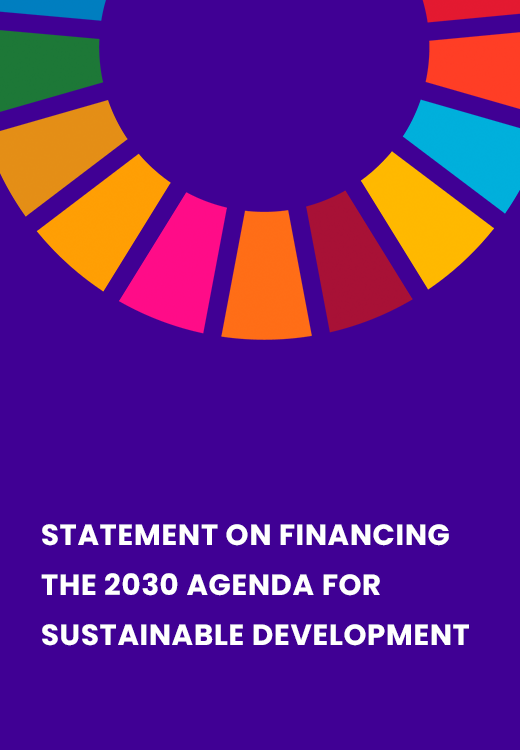Civil Society FfD Group’s Statement to the UN Secretary General’s High-Level Meeting on Financing the 2030 Agenda for Sustainable Development
This document has been collectively developed by the Civil Society Financing for Development (FfD) Group, a very broad platform of civil society organizations, networks and federations from around the world, including the Women’s Working Group on FfD. The Group followed closely the FfD process since its origins, facilitated civil society’s contribution to the Third International Conference on FfD, and continues to provide a facilitation mechanism for the collective expression of civil society in the FfD Follow-up process. While the group is diverse, and positions might differ on specific issues, this document expresses the elements of common concern. For more information, please visit the Civil Society FfD Group’s website.
We, participating organizations, networks and movements of the Civil Society FfD Group, welcome the initiative of the UN Secretary General to raise high level attention on key policy actions necessary to generate the means of implementation for the 2030 Agenda. However, we are deeply troubled by the almost exclusive focus of the meeting on mobilizing private investments. Not only does this overestimate the financial challenge, but also shifts attention away for the necessary policy and institutional transformations which are urgently required. We believe that to advance the 2030 Agenda the many structural barriers to socio-economic transformation need to be removed and systemic reform of the global economic framework is required to realign it with the imperatives of human rights, gender justice and people-centred sustainable development.
While aberrant inequalities, stagnating wages and limited investments in productive capacity continue to trap the world economy in a structural demand gap, signs of a new wave of “emerging economy crises” are increasingly evident. Debt levels have surged to record highs, while financial markets are in turmoil again with some developing countries particularly hit by financial outflows and currency speculation. In the case of Argentina, the largest ever credit line in IMF history does not seem effective in offsetting the high risk of currency collapse or arresting capital flight, exposing the inadequacy and replicating past policy responses. As a result, a growing class of working poor – particularly unpaid or underpaid young workers – are on the rise along with the feminization of poverty and old/new vulnerabilities. With less instead of better social protection, including for those most marginalized such as persons with disabilities, youth, small-scale food producers and migrants, socio-economic and political exclusion continues to increase.
Against this background, the framing of the HLM fails to place the necessary spotlight on overall system reform. We agree that the private sector should contribute much more to development finance. But we reject the dominant discourse that finance from the private sector comes in the form of investments, subjecting public goals to profitability and increasing public guarantees for private risks. On the contrary, we call for more effective taxation of private and corporate wealth, assets and income. This will provide States with adequate fiscal space to pursue their duty-bearer responsibilities and advance systemic policy reforms.
We therefore invite a stepping-up of leadership, ambition and concrete actions to change the current course and we reiterate all our existing asks, which can be found in our complete statement to the 2018 ECOSOC Forum on FfD (attached), including the call for an inclusive UN inter-governmental tax commission and the adoption of a Multilateral legal framework for sovereign debt restructuring.
We re-affirm the importance of multilateralism and demand firm and bold steps towards the necessary democratization of global economic governance. In this respect, the road map to the 2019 General Assembly’s High-Level Dialogue on FfD should be primarily centred on solid normative initiatives within the framework of the United Nations, with the ECOSOC Forum on FfD being the critical stepping stone. We stand ready to provide our untiring contribution to the process.
Download this statement as a PDF: CS FfD Group Statement to HLM on Financing 2030 Agenda – 24 September 2018
Annex: Annex – CS FfD Group Statement to the 2018 ECOSOC FfD Follow-up Forum

